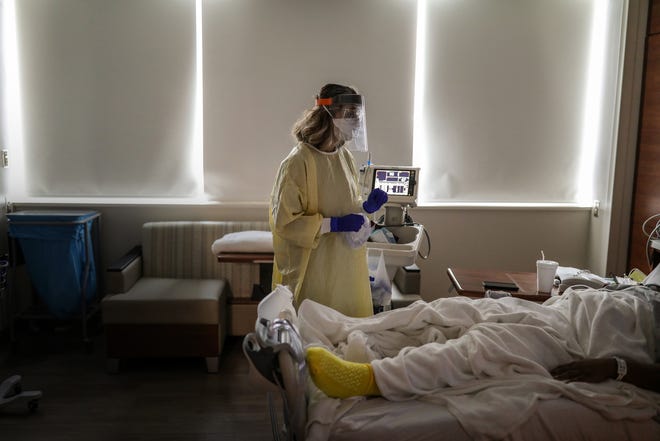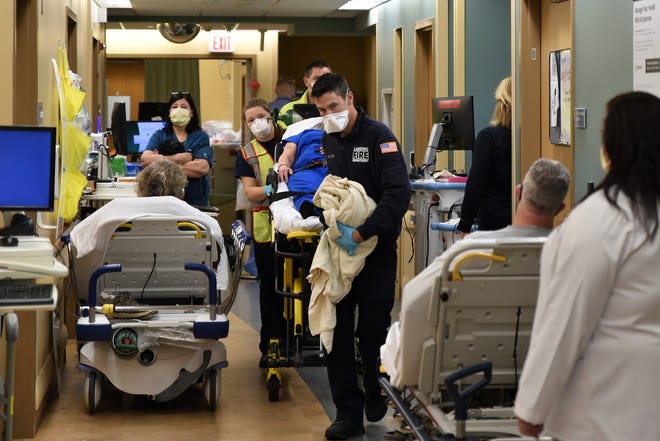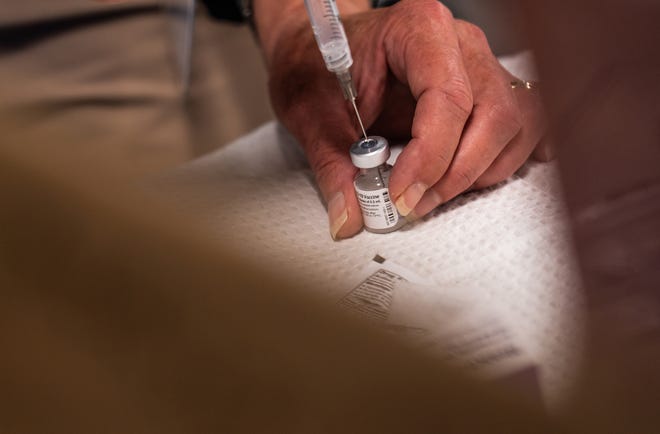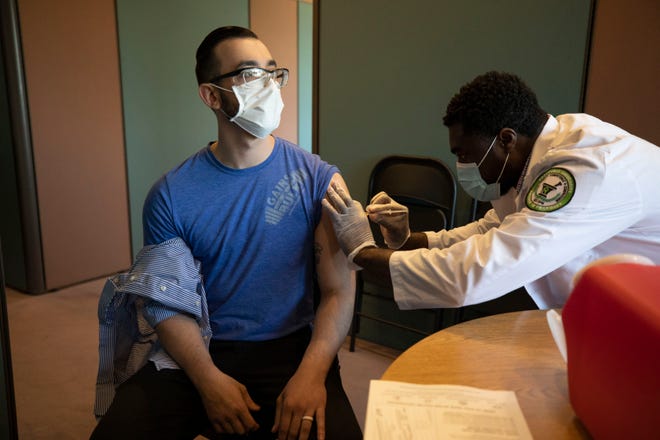Michigan catapulted Tuesday to the worst COVID-19 hot spot in the nation, as the seven-day case rate rose to 503.8 per 100,000 residents, according to the U.S. Centers for Disease Control and Prevention.
Hospitals statewide say they're feeling the pressure as the number of COVID-19 patients has climbed nearly 50% in the last month — from 2,097 patients admitted with confirmed cases of the virus on Oct. 18 to 3,082 on Monday, according to state data.
"The current growth in COVID-19 hospitalizations is very concerning," said John Karasinski, a spokesman for the Michigan Health and Hospital Association, which represents all 133 community hospitals in the state.

"They're seeing a stark increase in hospitalizations in just the past few days. ... We have both this stark surge of COVID-19 patients, but we also have hospitals that have been dealing with staffing challenges and staffing shortages, as well as high volumes of non-COVID patients. And we've been seeing that pent-up demand of non-COVID admissions since this past summer."
That means potentially long waits at emergency rooms, hospitals that have to postpone nonemergency medical procedures and some that can't accept new patient transfers, he said.
"All of our hospitals are available for all emergencies," Karasinski said, "but we do want to set the expectations for those in the general public that there are high wait times and if they have an issue that may not be an emergency to contact their primary care physician or to go to an urgent care clinic to try to ... balance loads that our hospitals are seeing right now."
Henry Ford Health System had admitted 330 people Tuesday to its five hospitals with confirmed cases of COVID-19. That's an almost 60% increase in the COVID-19 patient census in just the last three weeks, said Dr. Adnan Munkarah, Henry Ford's executive vice president and chief clinical officer.

"We were hoping that we would be in a better situation this Thanksgiving than we were last year, especially with the availability of the vaccines," Munkarah said.
"We've been watching with ... trepidation and worry, the number of COVID cases climb and rise throughout our community and around the state. ... The vast majority of the patients continue to be unvaccinated patients. So when we look at general admissions for COVID, 70 to 75% of those patients have been unvaccinated."
Bob Riney, Henry Ford's COO and president of health care operations, said the latest COVID-19 surge has forced the Detroit-based hospital system to postpone some medical procedures.
"There have been a couple of days where we have had to curtail some procedures in a couple of our hospitals because the overall volume, and particularly the growth of COVID, put us at capacity," Riney said.

"We evaluate that on a day-to-day basis and are doing everything we can to make sure that becomes an exception, not by any means the norm."
On the west side of the state, Spectrum Health reported Tuesday that it is seeing the highest rate of positive coronavirus tests of any point in the pandemic.
Of the 1,000 coronavirus tests processed by the Grand Rapids-based health system on Monday, 22.6% were positive, said Dr. Darryl Elmouchi, president of Spectrum Health West Michigan.
"Over the weekend, we had 25% positivity and our rolling average seven-day positivity, which is 22.6% within our laboratory, is the highest we've ever seen."
COVID-19 admissions across Spectrum's 14 hospitals climbed to 367 Tuesday, he said, adding that this surge "throws hospitals across our state well over what is a manageable capacity.
"The biggest risk that I think we all run going forward is that more and more patients doesn't mean that there we have access to more and more staff across the state," Elmouchi said.
Dr. Nick Gilpin, Beaumont Health’s director of infection prevention and epidemiology, said Thursday that COVID-19 admissions to the Southfield-based health system's eight hospitals were approaching 400.
"We're seeing community numbers increase. And I think with more cold weather on the way, with people starting to make plans for the holidays to get together, I think it's an important time just to let everyone know that we've got to stay vigilant," Gilpin said.
Lynn Sutfin, a spokesperson for the state health department, told the Free Press on Tuesday that the state's COVID-19 trends are being monitored closely.
"We are continually reassessing our statewide response to the pandemic," she said. "We urge all Michiganders to employ the mitigation strategies that have been proven to work including vaccination, wearing masks, social distancing, washing their hands and getting tested for COVID-19 and staying home if they are feeling ill."
People who've yet to take COVID-19 vaccines, Sutfin said, are fueling coronavirus hospitalizations and deaths.

Statewide, 73% of cases, 69% of hospitalizations and 74% of deaths from the virus have been among people who were unvaccinated or not yet fully vaccinated, she said, from Sept. 27-Oct. 26.
When people hear about vaccine breakthough cases, Riney said, "it would be easy to draw a false conclusion that ... the vaccines aren't working."
The average age of fully vaccinated patients at Henry Ford is 10 years older than those who are unvaccinated and hospitalized, Riney said.
"The majority have some other underlying complex clinical conditions that make them compromised," Riney said. "So the facts really still support that the unvaccinated population is being hit dramatically different than the vaccinated population as it relates to the activity that we're seeing today."
With just 54.1% of the state's population fully vaccinated against COVID-19, Riney said Michigan is vulnerable.

"It's that population that is filling our state's hospitals. And then that allows ... for the virus to live, mutate and persist," he said.
Anyone who is eligible for coronavirus booster shots, hospital leaders say, should get them now. There's a chance eligibility could expand for booster doses in the near future.
The New York Times reported Tuesday that the U.S. Food and Drug Administration and the CDC could authorize boosters for all adults by the end of the week, addressing concerns about waning immunity.
While boosters for all U.S. adults might help cut down on breakthrough infections, it won't come soon enough to help Michigan hospitals in crisis now.
As of Monday, 10 Michigan hospitals reported they were at 100% capacity:
- Detroit Receiving Hospital & University Health Center
- Hurley Medical Center
- McLaren Flint
- MidMichigan Medical Center - Gratiot
- Munising Memorial Hospital
- ProMedica Coldwater Regional Hospital
- Sparrow Eaton
- Spectrum Health Kelsey Hospital
- St. Joseph Mercy Chelsea
- St. Joseph Mercy Livingston Hospital
Twenty more reported they were at 90% or higher capacity:
- Ascension Providence Hospital Novi
- Ascension St. Mary's Hospital
- Beaumont Hospital - Troy
- Beaumont Hospital - Wayne
- Beaumont Hospital - Trenton
- Covenant Healthcare
- Henry Ford Macomb Hospital
- McLaren - Macomb
- McLaren Greater Lansing
- McLaren Northern Michigan - Petoskey
- McLaren Port Huron Hospital
- Metro Health Hospital
- ProMedica CV Hickman Hospital
- Sparrow Hospital - Lansing
- Spectrum Health - Big Rapids Hospital
- Spectrum Health - Blodgett Hospital
- Spectrum Health - Butterworth Hospital
- Spectrum Health - Pennock Hospital
- St. Joseph Mercy Hospital
- University of Michigan Hospitals & Health Center
- Since the pandemic began, there have been 1,209,712 confirmed cases of the virus and 22,862 COVID-19 deaths in Michigan, according to the state health department.
No comments:
Post a Comment
Note: Only a member of this blog may post a comment.